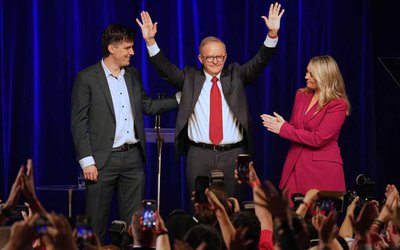More on Interview





Former foreign minister CHAKRA PRASAD BASTOLA has been a highly influential Nepali Congress leader. Known for his close association with Koiralas, Bastola had lived in exile in India with B.P. Koirala. As a former Nepalese ambassador to India, Bastola spoke to KESHAB POUDEL from his residence in Jhapa. Excerpts of the telephone interview:
As a former foreign minister and former Nepalese ambassador to India, how do you look at prime minister Dr. Baburam Bhattarai’s forthcoming visit to India?
Well, this is a regular visit. Every Nepali prime minister pays a visit to India as soon as they assume the post. However, one of the significant parts of the forthcoming visit will be to pave the way for minimizing the differences between Maoist and India.
Do you mean the visit is not as crucial as the media have projected it?One thing is almost certain that the visit will change the Maoist’s status of relations in India. Till now Maoists don’t have any relations at the political level. Their friendship is at the official level only. Maoist leadership, including Baburamji, maintains relations at the official level only. This visit will help them to establish their connection at all the spectrum of political level. India’s efforts will be to engage Maoists. Indians tried to engage Maoists in the past also, but the relations between them deteriorated following Prachanda’s step to remove then army chief Rukmangad Katawal, as well as Prachanda’s choice to visit China. Prime minister Dr. Baburam Bhattarai may try to create an environment to forgive and forget. India’s priority will be how to engage Maoists and preventing them from tilting to China and Baburamji’s efforts will be to show he and his party are friendly to India.
You mean the prime minister wants to change the present state of Nepal’s relations with neighbors?
Nepal has two neighbors, India and China. I want to refer his term that his government wants “political” relations with India and “economic” relations with China. This statement speaks volumes in the present context. Although Maoists have been saying that they want to maintain equi-distant relations with India and China, the question is how to maintain it.
Is it possible for leader Bhattarai to do so, when a Maoist group under the leadership of Baidya is opposing this?
Frankly speaking, Baidyaji is also not an anti-Indian group in the party. But, Baburamji seems to be the first choice of Indians. For this, India will do everything possible to strengthen Baburam’s leadership. By strengthening Baburam’s leadership, Indians believe, that they can neutralize Maoist party against China. At a time when Maoists have been talking about the need to improve the relations with India, I would not be surprised in case of Indian announcement of a major relief package during this visit.
What will be personal benefits to Dr. Bhattarai?
If Dr. Bhattarai will able to create some sort of a conducive environment to restore the relations with India, it will have a psychological boost for him in his party. This will help him to gain in the internal fighting in the party.
As Maoists are leading the government with support from Madheshi parties, will this have any meaning for this visit?
Formation of the Maoist-Madheshi alliance was designed just after the conclusion of the election of Constituent Assembly. However, it did not materialize then. Finally, this alliance was made with tacit support of India. This alliance will continue to lead the government for some time to come. In this context, it has a meaning.
Prime minister Dr. Baburam Bhattarai has declared that he will not sign any treaty with long term implications. Why did he make such statements?
It is not Bhattarai to decide what agreements he needs to sign or not to sign. In this crucial juncture, India will not impose any agreement upon him since India knows this is a government which does not have any mandate to ink a major treaty. India still faces criticism on the treaty of 1950 which was signed by last Rana prime minister Mohan Sumsher.
In the past, India used to push agreements during the visit of such interim prime ministers. Don’t you think it will repeat the same again? The situation is different now. This is a government with limited mandate: to bring the peace process to a logical end and promulgate the constitution. India will not take the risk to be criticized.
That means Dr. Bhattarai will not have to sign extradition treaty, security related treaties and many others?
Every country has its own national interest and India is not an exception. For any country, national interest is of prime importance and India’s interest in Nepal is its own security. Since this a favorable coalition to its national interest, India may seek some sort of concessions on its security interest. Instead of asking Bhattarai to sign any agreement, India can seek verbal assurance in one to one talk. In diplomacy, the verbal assurance has also a very strong meaning. I am certain that India may deal with petty issues but it will not force Baburamji to sign any controversial treaties. Of course, India might have many agendas with Nepal but it will not table the proposal from freeze.
If that is the scenario, why are Indian media, academicians and officials so enthusiastic about the visit?
Most of the Indians think the government led by Baburamji will look into India’s interests, including security interests, more closely than his predecessors, including Nepali Congress leadership in the past and leaders of other parties. It is natural for them to be enthusiastic with a person of JNU academic background, living in India for such a long time with several Indian contacts. Thus, Indians are very much enthusiastic about Baburamji. I don’t know how Baburamji will tread with India but Indian officials are expecting many things from Maoist-Madheshi coalition.
What does India want in Nepal?
My gut feeling is that India and China both want to see political stability in Nepal. They have realized that prolonged political instability is counterproductive to them. Given Nepal’s open border with India, Indians are more concerned about growing anarchy and instability in Nepal. Indians view that Nepal’s instability will have a long-term implication in bordering Indian states.
What can Nepal benefit from India?
It may help to solve Nepal’s internal problems, particularly in settling the political issues. In the context of Nepal’s inability to write the new process, India’s support is crucial and important. It is a well-known fact that Nepal cannot maintain political instability without promulgating the new constitution. If prime minister Bhattarai is able to cash this, Nepal will gain a lot. As Baburam well knows India and Nepal, he can make a difference. I am expecting that this visit will yield positive results.
Will it make any difference in relations with other parties?
One may have different opinions about the level of relations between India and Girija Prasad Koirala and India’s likes and dislikes about Koirala’s policy. What I can certainly say is that Sushil Koirala cannot replace Girija Prasad. Sushil Koirala is elected president of Nepali Congress but not an established leader in the country. He is no more than the president of Nepali Congress.







